
Erddig is a country house and estate in the community of Marchwiel, approximately 2 miles (3.2 km) south of Wrexham, Wales. It is centred on a country house which dates principally from between 1684 and 1687, when the central block was built by Joshua Edisbury, and the 1720s, when the flanking wings were added by its second owner, John Meller. Erddig was inherited by Simon Yorke in 1733, and remained in the Yorke family until it was given to the National Trust by Philip Yorke III in 1973.

Llanthony Priory is a partly ruined former Augustinian priory in the secluded Vale of Ewyas, a steep-sided once-glaciated valley within the Black Mountains area of the Brecon Beacons National Park in Monmouthshire, south east Wales. It lies seven miles north of Abergavenny on an old road to Hay-on-Wye at Llanthony. The priory ruins lie to the west of the prominent Hatterrall Ridge, a limb of the Black mountains. The main ruins are under the care of Cadw and entrance is free.

Tudweiliog is a small, predominantly Welsh-speaking village and community on the northern coast of the Llŷn Peninsula in the Welsh county of Gwynedd. It is in the historic county of Caernarfonshire. The population has risen from 801 in 2001 to 970 in 2011. The community includes the small settlement of Llangwnnadl. The community covers just over 35 square kilometres (14 sq mi).

Rhosddu is a suburb and community in Wrexham County Borough, Wales, covering the north-western parts of the city of Wrexham and comprises the wards of Grosvenor, Garden Village and Stansty.
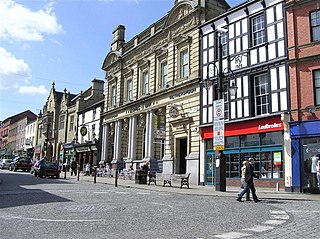
Wrexham city centre is the administrative, cultural and historic city centre of Wrexham, in North Wales and is the area enclosed by the inner ring road of the city. It is the largest shopping area in north and mid Wales, and the administrative centre of Wrexham County Borough. Many of its streets are pedestrianised.
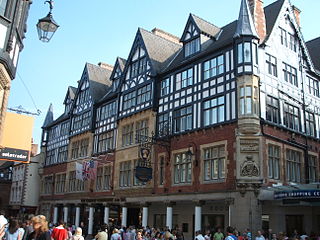
The Chester Grosvenor Hotel is a hotel in Chester, Cheshire, England. The Grade II listed building was built between 1863 and 1865 and is owned by the Duke of Westminster.

This is a list of listed buildings in Wales, which are among the listed buildings of the United Kingdom.
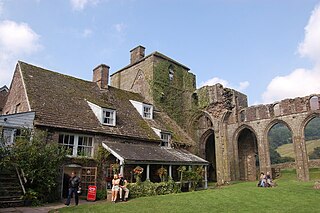
Abbey Hotel is a Grade I listed building incorporating a hotel and country inn in Llanthony, Monmouthshire, Wales.
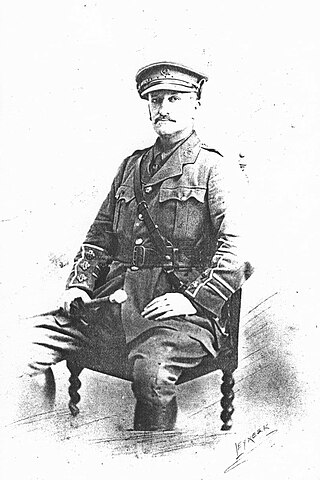
John Arthur Eyton-Jones was a Welsh footballer who played as a forward. He was part of the Wales national team between 1883 and 1884, playing four matches and scoring one goal. He played his first match on 17 March 1883 against Ireland and his last match on 29 March 1884 against Scotland.

The Wynnstay Arms is a hotel and pub in Wrexham city centre, Wales. It is located on Yorke Street and directly on the western end of Wrexham's High Street. The building is a Grade II listed building for its surviving Georgian red brick façade, while most of the building was demolished and rebuilt in the 1970s.

The Trinity Presbyterian Church is a presbyterian church in Wrexham, North Wales, part of the Presbyterian Church of Wales' Wrexham Mission Area. The church building was built and opened in 1908 to the Perpendicular Gothic designs of William Beddoe Rees. It is a Grade II listed building, covered in largely red brick and contains a tower.

Grosvenor Lodge is a Grade II listed building on Regent Street and Grosvenor Road, in Wrexham, North Wales.
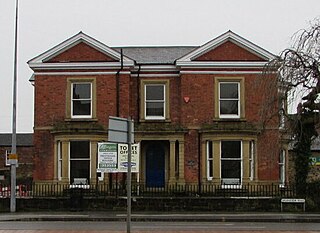
2 Grosvenor Road, originally Brynhyfryd, is a Grade II listed building on Regent Street and Grosvenor Road, in Wrexham, North Wales.

In the United Kingdom, the term listed building refers to a building or other structure officially designated as being of special architectural, historical, or cultural significance; Grade II structures are those considered to be "buildings of special interest which justify every effort being made to preserve them". Listing was begun by a provision in the Town and Country Planning Act 1947. Once listed, strict limitations are imposed on the modifications allowed to a building's structure or fittings. In Wales, the authority for listing under the Planning Act 1990 rests with Cadw.

In the United Kingdom, the term listed building refers to a building or other structure officially designated as being of special architectural, historical, or cultural significance; Grade II structures are those considered to be "buildings of special interest which justify every effort being made to preserve them". Listing was begun by a provision in the Town and Country Planning Act 1947. Once listed, strict limitations are imposed on the modifications allowed to a building's structure or fittings. In Wales, the authority for listing under the Planning Act 1990 rests with Cadw.

Chester Street is a street in Wrexham city centre, North Wales. It was once a main north–south road on the edge of the centre of Wrexham. The street has several listed buildings, as well as Wrexham's civic centre containing various council, memorial and leisure buildings, Coleg Cambria's Yale campus, Tŷ Pawb and various historical buildings now demolished.
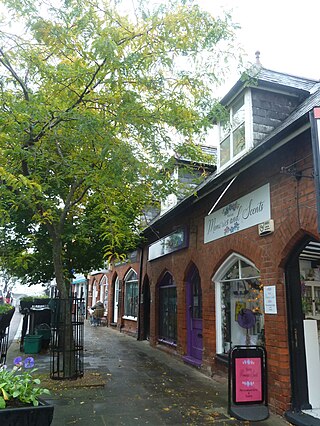
Charles Street is a street in Wrexham city centre, North Wales. It contains multiple listed buildings.

Grosvenor Road is a road and conservation area in Wrexham city centre, North Wales. The conservation area spans the road itself and adjacent streets, particularly all of Grove Road.
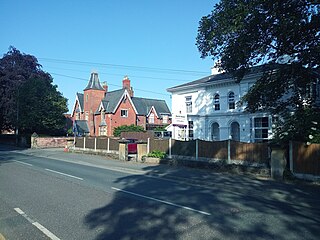
Grove Road is a road in Wrexham, North Wales. It dates to the 18th century and contains listed buildings. It is within the Grosvenor Road Conservation Area.

Church Street is a street in Wrexham city centre, North Wales. The street leads to St Giles' Church, and contains the Grade II listed Nos. 3–4 and the Grade II* listed Nos. 7–10, as well as the church gates of St Giles'. These gates form the entrance to the church's grounds, as well as a junction with Temple Row.






















